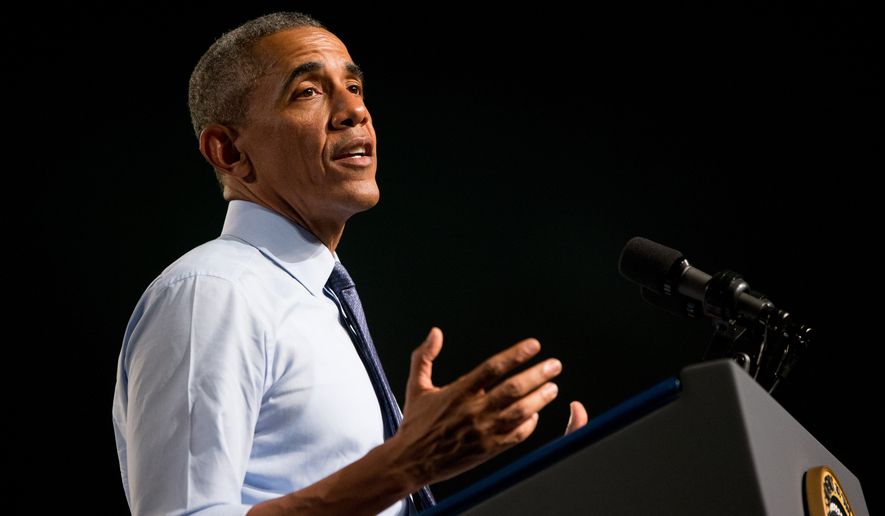President Obama found enough support in Congress to ensure survival of his nuclear deal with Iran, but he still has a steep hill to climb in convincing a skeptical American public — and Jewish voters in particular — that the agreement is in the best interests of both the U.S. and Israel.
Administration officials in recent weeks have mounted an all-out push to sell the deal, including personal pitches from the president Thursday to several key constituencies. The initiative comes at a critical time, as public support for the deal has dropped dramatically over the past two months.
Mr. Obama met with Gold Star Mothers — mothers of men and women who have died in the line of duty — at the White House Thursday and made the case the agreement is the best way to avoid another costly, bloody war in the Middle East. The president also hosted a conference call with American rabbis days before the start of Rosh Hashanah, and the administration said the conversation included the deal with Tehran. Mr. Obama also answered questions about the agreement in an online question-and-answer session Thursday afternoon.
In addition, the president has hosted Jewish leaders at the White House in recent weeks, and Vice President Joseph R. Biden last week made an in-person appeal to Jewish leaders in Atlanta.
The vice president also said Wednesday night that the administration is planning to meet privately with top Israeli officials, perhaps including Israeli Prime Minister Benjamin Netanyahu, the chief critic of the agreement. Mr. Netanyahu has cast the agreement as incredibly dangerous to Israel’s security, especially in light of the repeated threats to Israel from top Iranian officials.
Iran’s Ayatollah Ali Khamenei, for example, said this week that Israel will not exist in 25 years.
SEE ALSO: Senate Democrats sustain Iran nuclear deal, free Obama to lift sanctions
Moving forward, analysts say the administration’s hard sell of the Iran deal — both to Jewish groups and the public at large — is crucial and, following clearance by Congress, is now the next key step in solidifying support.
“If you want full support from Congress, you need public support. If you are going to develop any unity in the American approach to enforcing this agreement, you need to have public support as well,” said Anthony Cordesman, chair in strategy at the Center for Strategic and International Studies. “Creating an image of broad support for this agreement, particularly an image which indicates the next president will have reason to support it, that’s important.”
For his part, Mr. Obama is making the case that Republican opponents of the deal — which is designed to limit Tehran’s ability to acquire a nuclear weapon in exchange for relief from some economic sanctions — essentially want war with Iran. He argues American casualties are all but certain if the deal is not implemented.
“There are times where, in a debate like this, we hear a lot of loose talk, casual threats of military force, false promises that military actions will be easy or simple or relatively costless,” the president said after his meeting with Gold Star Mothers. “These veterans and their families remind us that is not the case. They know the consequences when we rush into war. They understand what it means when we act without broad international support and when we fail to consider unintended consequences.”
The White House also said that the president used Thursday’s call with rabbis to promote the agreement, telling them “the deal is consistent with his unwavering commitment to Israel’s security.”
His words came less than 24 hours after Mr. Biden used a Rosh Hashanah reception Wednesday night to both try and reassure Jewish leaders that the U.S. is committed to Israel’s security but also to make clear the White House will not, under any circumstances, change course.
“We are going to pass this. I know that disappoints some of you, but it’s a done deal,” he said. “I promise you, it will be enforced.”
As the administration continues its full-court press on Jewish leaders, broader efforts to get the public on board appear to be failing, as American voters remain unconvinced the deal represents the best path forward.
In July, 33 percent of Americans said they approved of the agreement.
This month, that figure has fallen to 21 percent, according to Pew Research Center data.
The president’s sales pitch, some analysts say, simply won’t be enough to reverse that trend.
“Whether the president works hard to sell this agreement as a good deal to the American people will matter little in the long run,” said Lara Brown, a political science professor at George Washington University. “Public opinion about the deal will be most impacted not by what the politicians in Washington or on the campaign trail say about the president or the deal, but what Iran does after the deal goes into effect and how effectively the U.S. and the rest of the world polices the provisions spelled out in the deal.”
On Capitol Hill Mr. Obama found the support of enough Senate Democrats to ensure Republicans couldn’t pass a resolution disapproving of the deal.
But a majority of lawmakers still oppose the agreement, perhaps planting seeds of doubt among allies that the U.S. has the fortitude to stick by the deal.
Mr. Biden acknowledged last week that other foreign leaders privately have expressed concern over whether the U.S. can fully implement and enforce the deal due to the political dysfunction in Congress.
Analysts say the relatively weak support in Congress, and among the public, could raise doubts in the minds of allies.
“The problem that has begun to develop is how much trust both our allies and our potential threats are going to place in American resolve and capability to react,” Mr. Cordesman said.
• Ben Wolfgang can be reached at bwolfgang@washingtontimes.com.




Please read our comment policy before commenting.